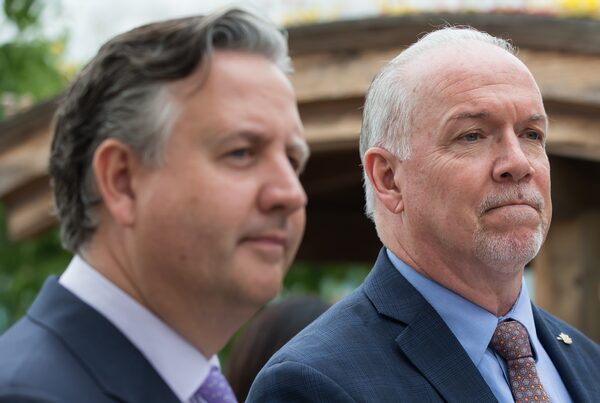
B.C. Premier John Horgan, right, and Vancouver Mayor Kennedy Stewart in Vancouver, on July 4, 2019.DARRYL DYCK/The Canadian Press
The City of Vancouver is seeking provincial approval to change the way some small businesses are taxed to address increases that some have said threaten their survival.
On Wednesday, a staff briefing to council laid out a split-assessment initiative Mayor Kennedy Stewart has personally asked B.C. Premier John Horgan to allow the city to enact.
Council endorsed the concept and asked staff to work with stakeholders to move the idea ahead.
The plan essentially clears municipalities to reduce the massive property taxes that small businesses, as well as those engaged in the arts, culture and non-profit sectors, can face on potential development.
In an interview, the mayor said he understood the proposal would be a Canadian first.
Explaining the idea, Mr. Stewart cited the example of a two-storey building with a mom- and-pop business on the first floor.
“If that building is rezoned for, say, a 12-storey building, what happens is the value of that building goes up and so does the tax assessment,” he said.
The increase is passed on to the small businesses. “That’s where you hear these stories of 200- or 300- or 400-per-cent tax increases without any warning.”
The mayor said the split assessment would mean small businesses would maintain their tax at the same level as before the development, with the new tax load redistributed among all businesses across the city.
“It’s a minuscule increase on commercial property. It wouldn’t even be noticed,” said Mr. Stewart, who said he raised the idea with Mr. Horgan in a meeting last week.
Mr. Stewart also said he raised the idea Tuesday with Surrey Mayor Doug McCallum. In a statement, a spokesman for Mr. McCallum said the mayor of the province’s second-largest city is “receptive to the idea.”
Mr. Stewart said there’s an urgency to the concept because it could save the small businesses that bring character to Vancouver neighbourhoods.
With prompt provincial approval, the mayor said the concept, available to other interested B.C. municipalities, could be enacted for 2020. “We’re just hoping for the change as soon as possible.”
Councillors contacted by The Globe and Mail offered their backing for the proposal, with some qualifications.
Pete Fry, of the Green Party, said the measure was long overdue. "It’s exciting to see that we may actually be within striking distance of a deal with provincial authorities to throw a lifeline to small businesses being strangled by high taxes.
“The practice of highest-and-best-use assessment has had a crushing effect on small businesses where they are effectively being taxed on the future imagined potential of their land as opposed to the actual use of the land.”
Jean Swanson, representing the Coalition of Progressive Electors, said she feared building owners may not pass on savings to tenants, but instead increase rents if taxes are reduced for smaller-business tenants.
“So I’m hoping that as staff works on this, they will be able to figure out a way to ensure that the actual small businesses who are most in need benefit from this, and not big land owners whose properties are upzoned,” she said in an e-mail exchange.
Lisa Dominato of the Non-Partisan Association said she backs the idea. “Independent small businesses are critical to a strong local economy. The creation of a new commercial sub-class will reduce the tax burden on small-business tenants and support their long- term viability," she said in an e-mail.
The B.C. municipal affairs and housing ministry said it was mindful of the Vancouver proposal, but is taking the time to properly canvas stakeholders in order to figure out how to proceed.
“This is a complex and important issue and any changes to the assessment system would apply across the province, so it is important that we take the time to get it right," said a statement issued by Melanie Kilpatrick, a media relations official for the ministry.
Aaron Aerts of the Canadian Federation of Independent Business said the organization supports split assessment, calling it a “big step in the right direction" on which the province should act.
“It can provide targeted and significant tax relief to those small business hit hardest by skyrocketing property taxes,” the organization’s western economist said in an e-mail.
“Too many [small businesses] have already been forced out of our neighbourhoods as a result of an archaic method of assessing and taxing business owners – something needs to be done.”
 Ian Bailey
Ian Bailey